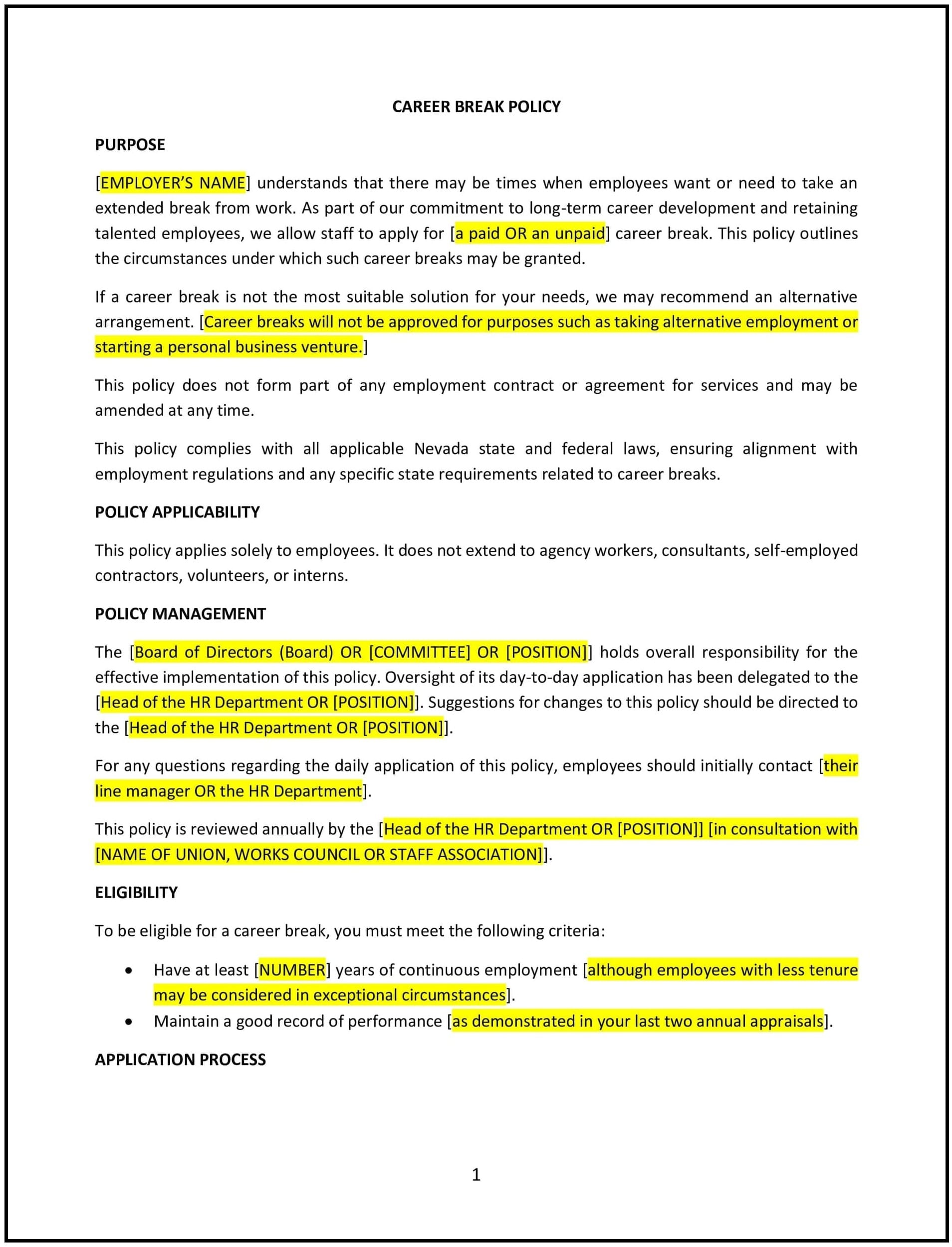Got contracts to review? While you're here for policies, let Cobrief make contract review effortless—start your free review now.

Customize this template for free
Career break policy (Nevada)
This career break policy is designed to help Nevada businesses offer employees the opportunity to take an extended leave of absence from work for personal or professional reasons. The policy outlines the terms and conditions under which employees may take a career break, ensuring that it is handled fairly and consistently while supporting the employee’s career development and personal well-being.
By adopting this policy, businesses can offer flexibility to employees, increase retention rates, and maintain a positive work environment.
How to use this career break policy (Nevada)
- Define career break eligibility: Specify who is eligible to take a career break, such as employees who have been with the company for a certain number of years or meet specific performance criteria.
- Set the duration of career breaks: Outline the length of time an employee may take off for a career break, typically ranging from a few months to a year, and how the duration is determined.
- Specify the purpose of career breaks: Clarify the reasons for which career breaks may be granted, such as personal development, family matters, or health-related issues.
- Address job security: Ensure that employees taking a career break are aware of their job security, including whether they are guaranteed to return to the same or similar position when they return.
- Provide financial considerations: Clarify whether career breaks are paid or unpaid and specify any benefits that will continue during the break, such as health insurance or pension contributions.
- Set expectations for communication: Establish guidelines for how employees should keep in touch with the company during their career break, including the frequency and mode of communication.
- Outline the process for applying for a career break: Specify the steps employees must take to request a career break, including any required documentation and the notice period for submitting the request.
Benefits of using this career break policy (Nevada)
This policy provides several key benefits for Nevada businesses:
- Increases employee retention: By offering career breaks, businesses can retain valuable employees who may otherwise leave due to personal reasons or life events.
- Supports work-life balance: Career breaks allow employees to address personal matters without the pressure of leaving their job, improving overall job satisfaction.
- Enhances employee well-being: Giving employees the opportunity to take time off for personal development or family matters helps promote a healthy and balanced life.
- Attracts top talent: Offering career breaks can be an attractive benefit for potential hires, positioning the company as a supportive and flexible employer.
- Reduces turnover: By accommodating employees’ personal needs, businesses reduce the likelihood of employees seeking opportunities elsewhere.
Tips for using this career break policy (Nevada)
- Communicate the policy clearly: Ensure that employees are fully aware of the career break policy and how they can apply, including during onboarding and in employee handbooks.
- Review requests fairly: Evaluate career break requests consistently and fairly, considering the needs of both the employee and the company.
- Set a process for reintegration: Ensure that employees returning from a career break have a clear process for reintegrating into the workplace and updating their skills if necessary.
- Be flexible with duration and reasons: Consider offering flexibility in the length of career breaks and the reasons for taking them, depending on the nature of the request.
- Maintain transparency: Be clear about the conditions of the career break, including job security, compensation, and benefits during the break period.